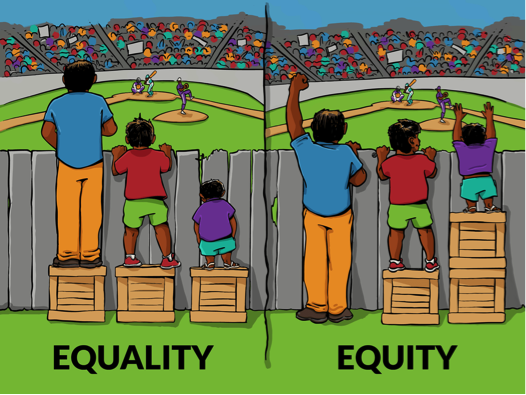According to the World Health Organization (WHO), equity is “the absence of avoidable or remediable differences among groups of people, whether those groups are defined socially, economically, demographically or geographically.” Therefore, as the WHO notes, health inequities involve more than a lack of equal access to needed resources to maintain or improve health outcomes. They also refer to difficulty when it comes to “inequalities that infringe on fairness and human rights norms.”
The U.S. Centers for Disease Control and Prevention (CDC) refers to health inequities and health disparities interchangeably as “types of unfair health differences closely linked with social, economic or environmental disadvantages that adversely affect groups of people.” As such, equity is a process or means and equality is an outcome of that process. Or, as the Race Matters Institute describes, “The route to achieving equity will not be accomplished through treating everyone equally. It will be achieved by treating everyone equitably, or justly according to their circumstances.”
Understanding the difference between health equality and health equity is important to public health to ensure that resources are directed appropriately — as well as supporting the ongoing process of meeting people where they are. Inherent to this process is the promotion of diversity in teams and personnel, public health practice, research methods, and other related factors. For these reasons, providing the same type and number of resources to all is not enough. In order to reduce the health disparities gap, the underlying issues and individual needs of underserved and vulnerable populations must be effectively addressed.
What is Equality?
Equality can be defined as treating each and every individual in the same manner irrespective of needs and requirements. This is to say that whatever the necessity of the individual is, it is ignored to promote the ideals of fairness and equal treatment.
Let us see by an example. If you are the teacher of a class and have been given the task of distributing chocolates to all the kids equally, what you will do is to divide the total number of chocolates you have by the total number of students in your class and arrive at the number to be given to each child. This is what is denoted by the concept of equality. But if you ask all your students to take off their shoes, mix them up, and then throw two shoes at each student, though you have done no injustice and given two shoes to each child thereby following the concept of equality, you find every child complaining. Why, because no shoe is now fitting the feet of the children. Some have large feet and have got smaller shoes while those having small feet have got bigger shoes causing discontent among them.
Thus it is clear that though equality is a good thing and needs to be followed across genders and religions, there is a concept called equity which states that everyone has different needs and requirements and should be treated accordingly.
Let us take another example to clarify the difference. Do you give the same amount of food to your toddler as you give to your husband? Obviously not, as you know that their requirements are different. Here the principle of equity is at work, but if you have two kids, you ought to divide cookies or pastries equally among them to avoid any altercation between them. This is the concept of equality. There are situations when people demand equality, to be treated as equals, and indeed this is how any government needs to treat his subjects, irrespective of religion, caste, creed, or gender. But then there are situations, such as when appointing people on merit in jobs or distributing financial aid among the needy. This is when any government has to apply the principle of equity and not equality. SEE: Principles of Access and Equity in Disability
What is the Difference Between Equity and Equality?
Definitions of Equity and Equality:
Equity: Equity can be defined as the quality of treating individuals fairly based on their needs and requirements.
Equality: Equality can be defined as treating each and every individual in the same manner irrespective of needs and requirements.
| Equity | Equality |
| Equity refers to fairness, justice, and impartiality | Equality refers to equal sharing and division, keeping everyone at the same level |
| Equity= Fairness and justice | Equality= Sameness |
| Equity is a need-based approach | Equality is not affected by the need of the people or society |
| It justifies things on the basis of quality | It justifies things on the basis of quantity |
| It focuses on need and requirement of an individual. Thus, known as the need-based approach | It gives same thing to all the people, irrespective of their need |
| Equity makes sure what is needed and in which quantity to an individual | Equality does not look at what is needed for an individual |
| Equity is the means/process | Equality is the outcome/end result of the process |
| Equity is subjective. It differs from situation to situation and from person to person | Equality is measurable. It does not vary and neither matter whoever looks at it |
| It identifies the differences and tries to reduce the gap between the groups | It is not concerned with the differences or gaps between two or more groups |
| Equity is positive discrimination | Equality might give rise to negative discrimination |
| People are treated fairly but differently | People are treated equally but may be unfairly |
| Here, people can get what they need | Here, people will only get what everyone else gets |
| Equity cannot be achieved through equality | Equality can be achieved through equity |
| It looks everyone differently | Does not look everyone differently |
| Proper analysis of the existing situation is needed to practice equity | No such as analysis is needed to practice equality |
| Equity can work even if people do not start from the same point | Equality can only work if everyone starts from the same place |
| Equity is taking a rationale and logical decision | Equality is mostly treating equally irrespective of being rationale or not |
| Example: In a family, giving a different quantity of food to all the family members as per their age, level of physical activity and dietary requirement of each of them is equity | Example: In a family, giving an equal quantity of food to all the family members irrespective of their requirement and need is equality |
| Example: Providing extra classes to the weak students | Example: Same classes for all the students OR extra classes for all the students irrespective of their grades |
| Example: When distributing a pair of shoes to the football players, giving the right pair of shoes as per their feet size | Example: When distributing a pair of shoes to the football players, giving a pair of shoes to all the players without any concern about their feet size |






